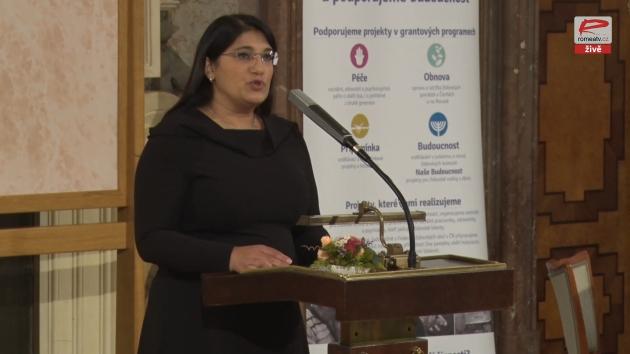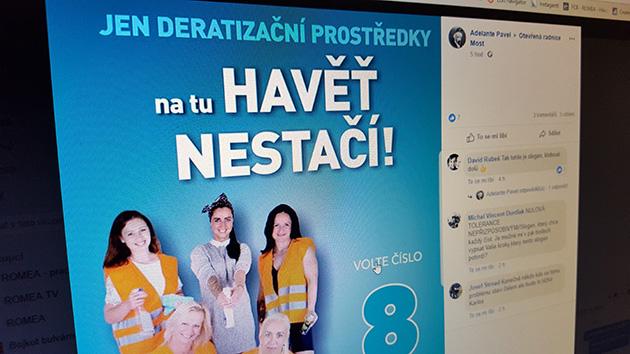Monika Mihaličková to the Czech Senate: Election laws must not allow the horrors of the Holocaust to repeat

On Friday, 25 January, a ceremony was held in honor of the Day for Holocaust Remembrance and Preventing Crimes Against Humanity at the Czech Senate. Senate chair Jaroslav Kubera gave his auspices to the event.
In November 2005 the United Nations General Assembly declared 27 January the International Day of Holocaust Remembrance. This year marks the 74th anniversary of the liberation of the Nazi concentration and extermination camp Auschwitz-Birkenau.
This day has been an official day of importance for commemorating the tragedy of the Holocaust in the Czech Republic since 2004. Romani community member Monika Mihaličková, who was asked to address the Senate on this occasion, said to news server Romea.cz that: “The Holocaust happened in Europe. It is necessary to remind ourselves of that so we can reduce the number of voices doubting whether it even happened. At the same time, we must keep a watchful eye so that the history of the Holocaust is taught in the schools, including the Holocaust of the Roma. That aspect of it is detracted from and doubted even more frequently.”
The Czech Senate commemoration is annually attended by dozens of survivors of the Nazi concentration camps, by representatives of organizations bringing together former prisoners (such as the Auschwitz History Group, Hidden Children, the Terezín Initiative), Senators, ambassadors, the Chief Rabbi of the Czech Republic, the Archbishop of Prague, and other eminent figures of cultural, political and religious life. The Federation of Jewish Communities in the Czech Republic arranged for speeches by Senator Kubera, by the chair of the Chamber of Deputies, MP Radka Vondráčka, and for the reading of a written statement from Czech Prime Minister Andrej Babiš.
A former prisoner of Auschwitz-Birkenau, Jiří Fišer, was invited to address the gathering, as did Monika Mihalíčková, a psychologist, on behalf of the Romani minority. Speeches were also invited from the EU Commissioner for Justice, Consumers and Gender Equality, Věra Jourová, and from the chair of the Federation of Jewish Communities in the Czech Republic, Petr Papoušek.
The program also included a musical element. A concert of compositions by Erich Adler, Gideon Klein and Janot Roskin was scheduled to be performed by Amaliya Abdurashidová, Daniela Grygarová and Táňa Wajs.
Full transcript of the speech by Monika Mihaličková
Dear Ladies, Dear Gentlemen, Dear Holocaust Survivors, Dear Legislators,
“We’ll build a village for the riff-raff”, “If you don’t know how to behave, you can’t live with us”, “Poison isn’t strong enough for these pests”, “Inadaptables don’t just have to be dealt with, they need to be dealt with once and for all”, “When people improve animals and plants by breeding them, nobody minds. If you want to do the same with human beings, then it’s bad. However, everybody knows that beautiful blue eyes are in demand at the clinics.”
Last autumn we held elections to local assemblies and the Senate here in the Czech Republic, and I contributed, along with other colleagues from the organizations RomanoNet and ROMEA, to a campaign called “ME DŽAV! A so tu?”, which in translation means “I’m going! Are you?” The aim of that campaign was for Romani people to realize the importance of voting and to increase their participation.
We succeeded, achieving the absolutely highest-ever Romani voter turnout in the history of the Czech Republic in many locations. One example of record Romani turnout was at the northern Bohemian housing estate of Chánov.
What we encountered during the course of those elections, however, very often took our breath away. The remarks I just cited in my opening here are the same ones, dear ladies and gentlemen, that were being used just a couple of months ago during that election campaign.
Yes, such remarks are being made even as part of election campaigns in the Czech Republic. A country with a well-developed democracy, sitting in the heart of Europe.
That leads me to ask: Isn’t it all happening again here? Isn’t somebody here attempting, once more, to put people behind barbed wire and adopt a Final Solution for them?
How else can we explain the words used during these election campaigns? What do you all imagine when somebody says: “The inadaptables don’t just have to be dealt with, they need to be dealt with once and for all?”
I apologize to the survivors present. I think I cannot even imagine what must be going through your heads right now.
My grandfather, who did not live long enough to meet me, had a number tattooed on his forearm, too. They didn’t even bother taking his two brothers to a camp, though.
They just hanged the one and shot the other. Granddad survived those horrors and never wanted to speak of them.
I do not want anything like that to ever happen again. For that reason, I decided to stand up to this behavior, and I filed a criminal report against the use of these slogans.
Many other citizens joined me. Last week the Czech Police sent us the information that in the case of the political group that had succeeded in the local elections, their slogans were neither a felony or a misdemeanor and the case had been shelved.
On the other hand, in the case of the party that failed in the elections, their slogans were considered possible misdemeanors and the police had passed them along to be dealt with as such by the local authority. That’s interesting, don’t you think?
In any event, the fight against this behavior was joined in particular by four brave gentlemen from Chánov who were not afraid to turn to the Regional Court in Ústí nad Labem and then to the Constitutional Court with a complaint about the election as a whole. These gentlemen did this despite knowing it would bring them significant problems, for example, at work.
We must appreciate their taking action even more because of that. Through this election complaint and the following Constitutional complaint, these four heroes were seeking to annul the elections to the local assembly of the City of Most, or if full annulment would not be possible, they were asking for the exclusion of all of the candidates from the parties that used the remarks I have just described as part of their campaigns.
At the same time, the gentlemen pointed out that there is no legal mechanism here for handing down an injunction prior to an election, which is a common institution in other European countries. Here I would like to explain what that is.
An injunction prior to an election means that an electoral court would have the opportunity to intervene in the course of a campaign prior to ballots being cast, including in cases where it has been granted the power to decide whether to ban obnoxious campaign materials, the content of which violates human rights, and to therefore prevent voters from being influenced by them. The Constitutional Court has called on the Czech Parliament to introduce this kind of election campaign protection more than once.
The Constitutional Court agreed with the plaintiffs in this case, stating in its judgment that the current law is full of loopholes and that the situation has been made worse by the most recent amendments to the election law that took effect on 1 January 2017. In other words, our laws are currently so badly written that they are unable to prevent horrors like these slogans.
The Constitutional Court also reminded us that it is unable to create election regulations on its own. Legislation can only be adopted by the Parliament of the Czech Republic.
Nevertheless, the four gentlemen have not given up and are continuing to fight. They are doing so together with the person who is the biggest heroine in this story, an attorney who has taken up this entire case pro bono and out of a deep belief in it, based on the conviction that it is necessary to defend the basic democratic values of this state.
A couple of days ago they all filed an application to the European Court of Human Rights in this matter. Even though, as a citizen, I regret that things have had to go so far, I will be glad if the court rules against the Czech Republic in this case.
I say that because of the prospect of the European Parliamentary elections ahead of us this year and, in two years, elections to the lower house. Certainly, democracy is not now and never will be a perfect system.
Democracy is the best system in which it is possible to live, though. Nothing better has been invented yet.
Of all known political systems, democracy is the one in which people are guaranteed the greatest degree of freedom. However, it also has one particular historically-demonstrated ability.
Under certain circumstances, democracy is able to destroy itself – unless it defends its own basic values. Václav Havel captured this fact quite precisely when he said: “The natural disadvantage of democracy is that it binds the hands of those who genuinely believe in it, while making almost everything possible for those who do not take it seriously.”
So, if we allow the bases of our democracy to be undermined in this way, we should not be surprised if one day we wake up in a state that will no longer be democratic, one where people are no longer equal in terms of dignity and rights, and no longer free. In such an undemocratic state, people would be discriminated against on the basis of their language, national origin, race, religion, sex or social status.
In such an undemocratic state, you all would no longer have your right to life and personal safety guaranteed. Now, many of you here are lawmakers.
I comprehend that word to mean that you are the ones who give us legislation. That means you are the ones who create the laws.
We are a relatively young democracy, and not all of our laws are perfect. Speaking as a citizen, I want to ask you all to change this election legislation so that it will not allow the horrors of the Holocaust to be repeated.
